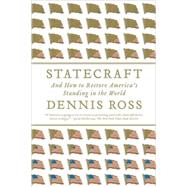
Note: Supplemental materials are not guaranteed with Rental or Used book purchases.
Purchase Benefits
What is included with this book?
| Preface | p. ix |
| The Bush Foreign Policy and the Need for Statecraft | p. 3 |
| Cases of Statecraft: German Unification in NATO | p. 29 |
| Cases of Statecraft: Bosnia | p. 48 |
| Cases of Statecraft: Undoing Iraqi Aggression in Kuwait | p. 73 |
| Cases of Statecraft: Saddam, George W. Bush, and the Iraq War | p. 100 |
| Lessons of Statecraft for Today | p. 133 |
| Statecraft in a new World | p. 143 |
| Negotiations as an Instrument of Statecraft | p. 173 |
| Negotiations: Twelve Rules to Follow | p. 187 |
| Mediation in a World of Local Conflict | p. 216 |
| Eleven Rules for Mediation | p. 237 |
| Practicing Statecraft: The Israeli-Palestinian Conflict | p. 259 |
| Practicing Statecraft: Radical Islam and the Challenge of Iran | p. 286 |
| Practicing Statecraft: China's Rise | p. 319 |
| Conclusion: Statecraft Restored: A Neoliberal Agenda for U.S. Foreign Policy | p. 333 |
| Afterword | p. 343 |
| Notes | p. 359 |
| Acknowledgments | p. 375 |
| Index | p. 377 |
| Table of Contents provided by Ingram. All Rights Reserved. |
The New copy of this book will include any supplemental materials advertised. Please check the title of the book to determine if it should include any access cards, study guides, lab manuals, CDs, etc.
The Used, Rental and eBook copies of this book are not guaranteed to include any supplemental materials. Typically, only the book itself is included. This is true even if the title states it includes any access cards, study guides, lab manuals, CDs, etc.